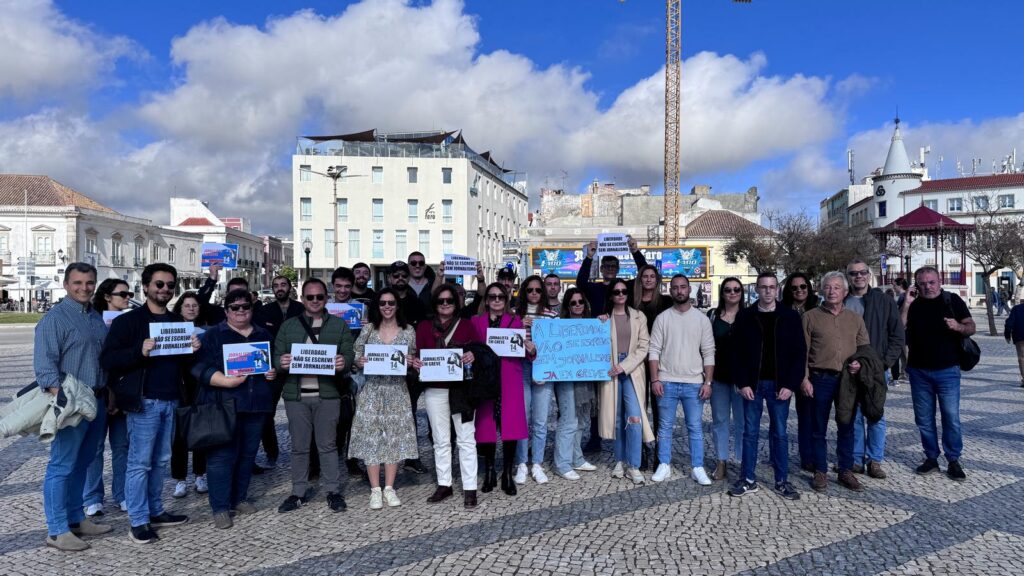Month after month, we hear about strikes: from teachers, civil servants, nurses, doctors or even police.
When it is said that we have heard about it, it is because it is practically a given. We don't even question why we know that this is happening.
The truth is that there was someone who, in order to tell us that someone did not show up for a certain shift, woke up before that shift started.
He spoke with the strikers, most likely, with the employers, with the Government, he will outline the reasons for the strike and will take stock.
Today, if everything goes well, none of this will happen. It's because? Because it is the journalists who are on strike.
A strike that, unlike others, will be more relevant the greater the “silence” on the front pages, television news and radio.
Perhaps one day of stoppage, in the space of decades, is not enough for us to miss the work that journalists do.
It is said that journalism is a pillar of democracy. And that is, for me, and I hope for everyone who reads me, unequivocal.
However, since, despite so many difficulties, this pillar, for decades, insisted on not giving in completely, it became a guarantor, which we ended up devaluing.
Allow me to make a risky comparison with older family members. Sometimes we don't give them the importance they deserve. They may, at times, seem like an obstacle, but if they didn't exist, we wouldn't exist either.
This is a little like how I see the relationship between journalism and democracy.
When you ask someone about essential professions, I venture, almost no one will remember the journalist. And I understand why.
Directly, the journalist will not save lives like the doctor, the firefighter, or the police officer. He doesn't feed mouths, like a farmer, he doesn't create wealth, like a businessman.
However, the perception we have of the importance of each of these professions comes, exactly, from the importance that public opinion gives them.
And it is there, in creating this public opinion, that the journalist is essential.
If we think carefully about the qualities that a good journalist should have, they should be paid very well.
A journalist must know how to write (at least) as well as a Portuguese teacher, he must speak languages, know history, geography, environment, politics, literature, music…. Basically, he must have a general culture that is well above average and always up to date.
He must also have the argumentation capacity of a politician, the improvisation capacity of an artist, good diction and an excellent ability to synthesize. You must, of course, have computer knowledge, at least “from the user's perspective”.
If you look good enough to look good on camera, it's a bonus (in this case, some of the previous requirements may not be decisive in recruitment).
However, a journalist's salary, taking into account the basic requirements for the good performance of the profession and its social responsibility, is low, very low. In such a way that it is little higher, at the beginning of your career, than the minimum wage (and this is thanks to the new Collective Labor Agreement that came into force last year).
Anyone who thinks I come here to talk about salary issues as the main problem of the class is mistaken. No. This is just one of the many reasons for this strike called by the Journalists Union.
And, either I'm very mistaken, or the vast majority of professionals who go on strike today don't do so just to get a pay rise.
This is a necessary strike to look at a sector that, as I have already argued, is essential, but undervalued.
And yes, there is good and bad journalism. And sometimes the bad outweighs the good. And, yes, journalists helped dig the hole in which the profession finds itself.
We can ask: so the journalists didn't see what they were getting into? And I will say yes, they saw it. And they see. And I even think that journalists are their main critics, because when a journalist does shit, he knows he's doing shit.
If you don't know – and here we come into another problem, which has to do with training – you should know.
But then, why is there bad journalism?
Because bad journalism “pays” better than good journalism to those who promote it (and not to those who do it), that is, to those who decide to do business selling news “by the meter” and to those who measure news value by monetary value.
When this is the case, journalism abandons part of its mission, without journalists being able to do much about it, under penalty of losing the job they dreamed of (and as we saw above, it is not due to a lack of ability to work in other areas).
Of course, in theory, journalists can refuse to do certain jobs, according to their conscience. But, in practice, who is the precarious person who will stand in front of a manager repeatedly?
Therefore, so that newspapers and radio and television can continue to play their role, I hope that this strike can at least help the State to look at this sector as it deserves.
Nobody questions the investment and role of the State in Education, do they?
If Education prepares the Future, Information builds its foundations in the Present!
The warning signs are there. Do we want to close our eyes?
Author Nuno Costa is founder of Sul Informação, journalist since 2008, but “on hold” since 2022. He is currently commercial director of Sul Informação. But he still has the soul of a journalist
Note: This chronicle was written yesterday, March 14th, the day of the Journalists' General Strike and all temporal references have to do with this day.


















Comments